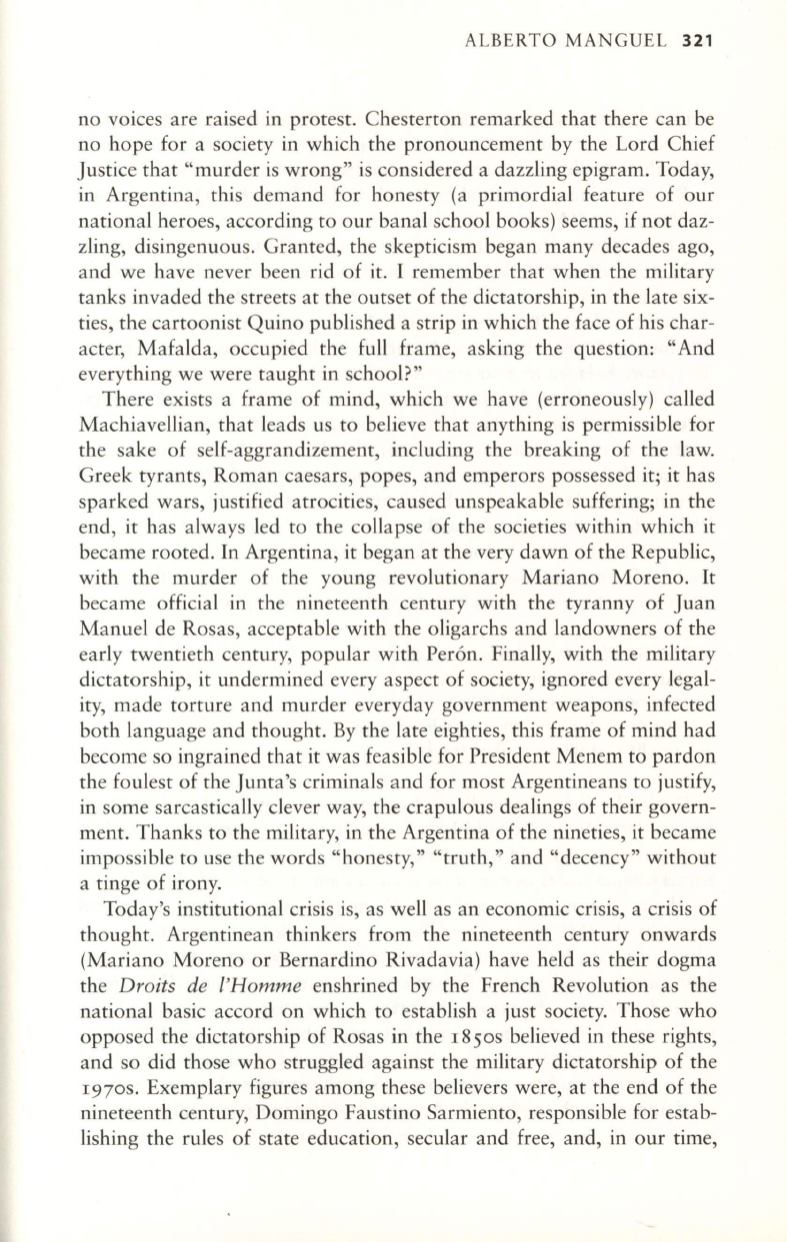
ALBERTO MANGUEL
321
no voices are raised in protest. Chesterton remarked that there can be
no hope for a society in which the pronouncement by the Lord Chief
Justice that "murder is wrong" is considered a dazzling epigram. Today,
in Argentina, this demand for honesty (a primordial feature of our
national heroes, according to our banal school books) seems, if not daz–
zling, disingenuous. Granted, the skepticism began many decades ago,
and we have never been rid of it. I remember that when the military
tanks invaded the streets at the outset of the dictatorship, in the late six–
ties, the cartoonist Quino published a strip in which the face of his char–
acter, Mafalda, occupied the full frame, asking the question: "And
everything we were taught in school?"
There exists a frame of mind, which we have (erroneously) called
Machiavellian, that leads us to believe that anything is permissible for
the sake of self-aggrandizement, including the breaking of the law.
Greek tyrants, Roman caesars, popes, and emperors possessed it; it has
sparked wars, justified atrocities, caused unspeakable suffering; in the
end, it has always led to the collapse of the societies within which it
became rooted. In Argentina, it began at the very dawn of the Republic,
with the murder of the young revolutionary Mariano Moreno. It
became official in the nineteenth century with the tyranny of Juan
Manuel de Rosas, acceptable with the oligarchs and landowners of the
early twentieth century, popular with Peron. Finally, with the military
dictatorship, it undermined every aspect of society, ignored every legal–
ity, made torture and murder everyday government weapons, infected
both language and thought. By the late eighties, this frame of mind had
become so ingrained that it was feasible for President Menem to pardon
the foulest of the Junta's criminals and for most Argentineans to justify,
in some sarcastically clever way, the crapulous dealings of their govern–
ment. Thanks to the military, in the Argentina of the nineties, it became
impossible to use the words "honesty," "truth,'J and "decency" without
a tinge of irony.
Today's institutional crisis is, as well as an economic crisis, a crisis of
thought. Argentinean thinkers from the nineteenth century onwards
(Mariano Moreno or Bernardino Rivadavia) have held as their dogma
the
Droits de I'Homme
enshrined by the French Revolution as the
national basic accord on which to establish a just society. Those who
opposed the dictatorship of Rosas in the 18
50S
believed in these rights,
and so did those who struggled against the military dictatorship of the
1970s. Exemplary figures among these believers were, at the end of the
nineteenth century, Domingo Faustino Sarmiento, responsible for estab–
lishing the rules of state education, secular and free, and, in our time,


